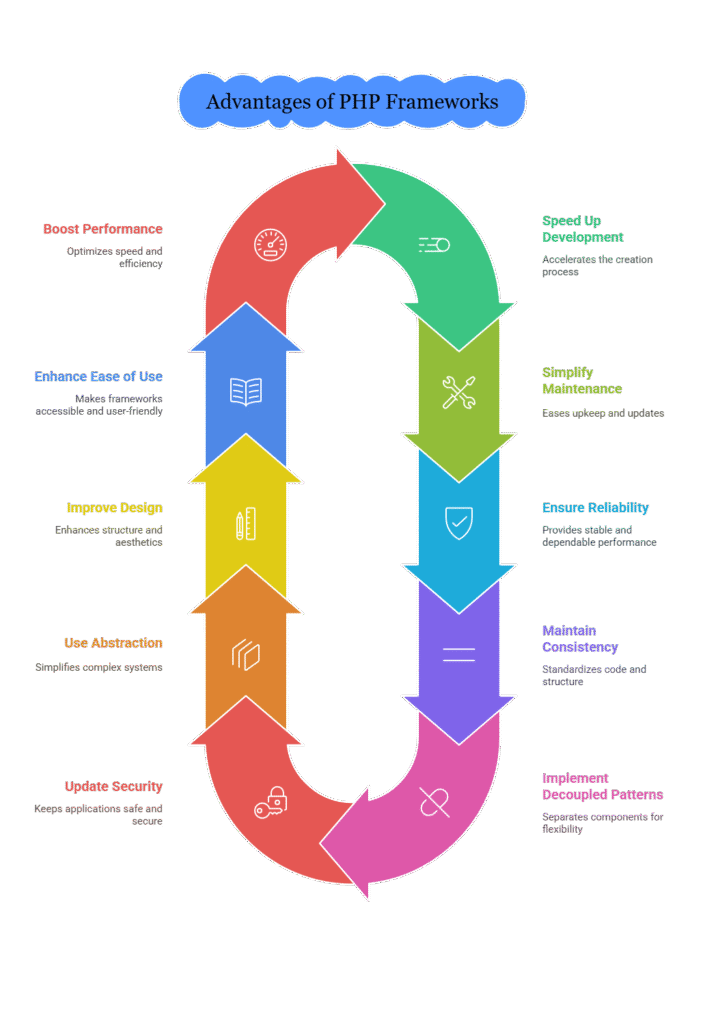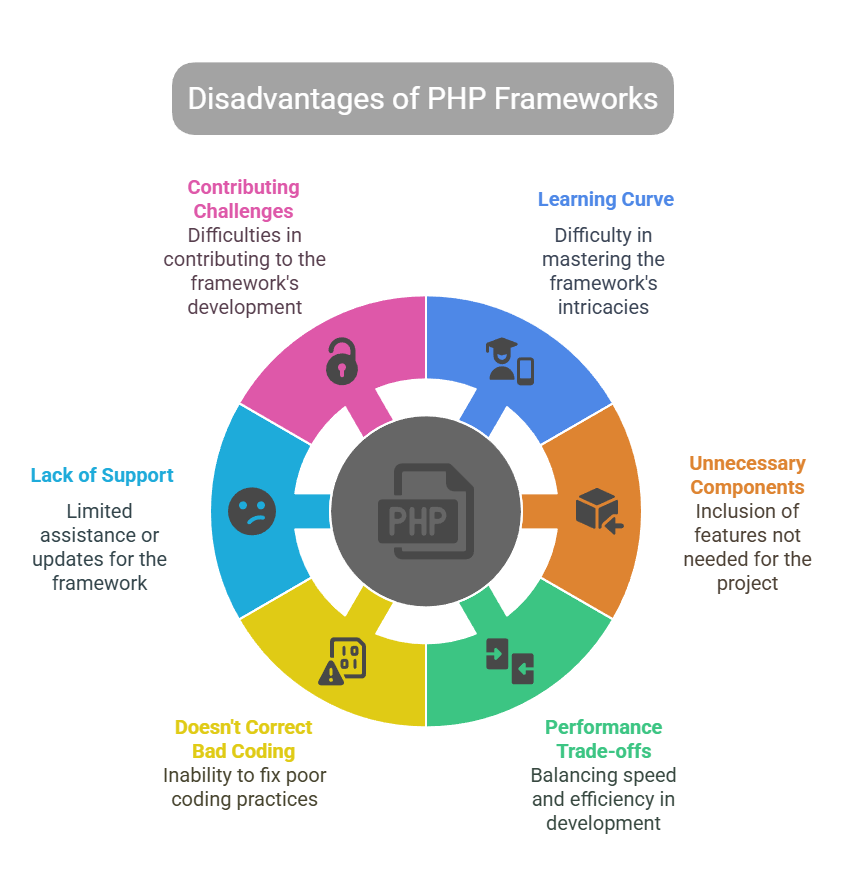Discover the key Advantages of PHP frameworks including faster development, cleaner code, built-in security, and scalability for modern web apps.
A framework is a set of programs or software that facilitates coding and code implementation, enabling programmers to accomplish tasks quickly. It serves as a basic template or supporting framework for further development. In essence, it’s a collection of general code typically classes that can be rapidly expanded to build any kind of website.
It represents the framework on which you decide to build your software and doesn’t include any code unique to any one project. Frameworks employ numerous design patterns and best practices so that developers can use them to address issues fast. By utilising PHP frameworks, you can reuse pre-existing components and concentrate on providing business value rather than investing effort in creating basic layers like database connections, session management, and security elements. You develop on top of pre-existing, extensively used, and proven tools.
Advantages of PHP Frameworks

Speeds up application development
Frameworks free you from the burden of creating reusable patterns, testing frameworks, and authorisation and authentication procedures so you can concentrate on new features and needs. In terms of laying the groundwork for a safe, standardised code base, this saves a great deal of time. Reusing a framework’s current components allows you to start developing new features and advancements right away. They assist you in avoiding tedious coding jobs.
Simplifies application maintenance
The development team may easily maintain the application features and occasionally update the core framework as the framework team is in charge of maintaining the program’s fundamentals. Frameworks can also assist in managing versioning and code management.
Reliability
Frameworks frequently incorporate tried-and-true components and are based on tools that have already been extensively tested. Frameworks offer dependability when writing code, however they don’t provide answers for poor programmers. They are frequently identified as enterprise-ready and have the potential to be steady and sustained. PHP is built to be dependable.
Consistency and Standardisation
Frameworks offer a standard code base and cutting-edge coding architectures. They provide standardised, advanced, and safe methods for control flow and integration, including the MVC pattern. Using frameworks facilitates the usage of pre-existing patterns and styles by teams, as well as the ease with which other developers can join you and comprehend your code. They offer conventions and structure. The MVC design pattern, which helps divide the many components of a web site, is used by the majority of PHP frameworks. Developers may build clear, maintainable code with Agavi.
Decoupled patterns
A number of patterns that mimic a decoupled system design are preloaded into frameworks. This makes it easier to separate concerns, frequently using the MVC approach.
Updated patches and Security
Frameworks that are actively maintained take a proactive stance when it comes to security and bug fixes. In addition to features like input validation, output filtering, and SQL injection protection, frameworks frequently offer a fairly safe method of managing users, permissions, and sessions. They may also come with cryptographic and secure coding tools. They have elements of security. SQL injection, output filtering, and input validation are all included in yiiFramework. Secure coding tools and cryptography are the foundation of Zend Framework’s operation.
Abstraction and Reusable components
Frameworks offer a toolkit of reusable components for processing, security, validation, and session handling, among other settings. They provide abstractions for layers like as sessions, security, and database connectivity. Database libraries and test frameworks are frameworks. By expanding the framework or plugin systems, they let you create custom layers. As a package management tool, Composer makes it easier for many common libraries to be reused across frameworks, which promotes framework compatibility. Almost all online applications require common characteristics, and frameworks provide generic solutions for them. A collection of reusable parts is offered by Symfony. Some excellent elements of dependable, well-tested code have been incorporated into Laravel. Codeigniter offers a straightforward and sophisticated toolbox.
Better design and structure
Frameworks, which frequently use design patterns like MVC, promote structured code and aid in the division of various web application components. They advocate using formal development methods. Maintainability, flexibility, extensibility, and reusability are all impacted by the proper design patterns.
Ease of use and Learning
Symfony is characterised as being particularly user-friendly because to its extensive documentation, professional community assistance, and flexibility and accessibility. For novices, using a framework can be quite simple. They make it easier for teams to swiftly comprehend and apply conventions, project structure, libraries, and other things. For ease of use and learning, documentation is crucial. Support from the community is also essential.
Easier project enhancement
Compared to a website or web application created purely in ” PHP” it is much simpler to improve its features if it was created using a framework. Frameworks increase the future-proofness of code.
High Performance
Performance is a consideration in the design of some frameworks. To operate more quickly, Phalcon is integrated with cutting-edge architecture. CodeIgniter performs exceptionally well. Because of compiled code and less I/O, C-based frameworks like Phalcon can provide faster execution.
Disadvantages of PHP Frameworks

Learning Curve
The learning curve for frameworks can be rather high. “Fun and challenging task” is how one characterises learning frameworks. “A lot of configuration before starting” is necessary for certain frameworks. You must invest “quite a lot of time on learning how to use each one” because of all the capabilities they have. The “many base and advanced components and concepts” can make this especially difficult. Businesses frequently demand that developers possess familiarity with the particular framework they employ. It is advised that novice developers study Core PHP first in order to comprehend the code before utilising frameworks.
Can be Large and Include Unnecessary Components
Complete frameworks frequently feature “all the fire power,” which may include packages that aren’t required for a given use case. “All the features” are present in comprehensive and sturdy frameworks. Therefore, a “huge size” may result. Even if you don’t use all the functions, keeping with them could make your application sluggish if these frameworks aren’t organised into modules.
Performance/Debugging Trade-offs
It is slower to use a PHP-written layer, like a database abstraction layer that is frequently found in frameworks, than to use built-in PHP methods, particularly when operating without an opcode cache. Layers of database abstraction give up some performance in exchange for resilience. Unlike PHP classes, the code in C-based frameworks like Phalcon is compiled, making debugging and patching more difficult. Performance must frequently be sacrificed in order to increase security.
Doesn’t Correct Bad Coding
Frameworks don’t provide fixes for poorly written code. They offer dependability when developing code, but they don’t automatically fix bad programming techniques or reasoning.
Lack of Support or Active Development
Even though a framework is now undergoing development, things could change in the future. When selecting one, it’s critical to take into account both historical and contemporary trends in the framework team, development, and activity.
Challenge of Contributing
For a typical PHP developer, writing and compiling C language code which is required to contribute to frameworks constructed as C extensions, such as Phalcon can be a little difficult.
Popular PHP frameworks mentioned in the include
Laravel, Symfony, Zend Framework (now Laminas), CodeIgniter, CakePHP, Slim, Yii, Phalcon, FuelPHP, yiiFramework, Agavi, Lumen, Silex, PHPixie, Drupal, Kohana, Nette, Qcodo, Silverstripe, and Solar.
